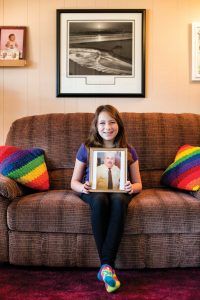They were relatives – and best friends. Eleven-year-old Allison Sokolic and her grandfather had a close relationship: he doted on the only child; she adored the man she called “Popster.”
“We used to always go shopping together and swim in the pool together.
I would splash him, and we would hit each other with the pool noodles,” Allison says. “He told me I was his favorite person in the world.”
But in early 2013, her grandfather’s health took a turn for the worse.
“He had Type 2 diabetes, and he was very stubborn – he would never go see a doctor,” says Allison’s mom, Beth Sokolic of Cherry Hill. “All of a sudden he was having trouble breathing. Finally he went to the doctor, and they found four blockages in his heart – he needed a quadruple bypass. But he wasn’t a candidate, because there was an issue with his lungs. It was just so many things.” Beth’s father-in-law died suddenly in May 2013 at age 62. “It was unexpected. It was too late, and it happened pretty fast.”
As the family struggled to process their grief, Beth began to worry about how Allison would cope with the sudden loss of her beloved grandfather.

Allison Sokolic holds a photo of her late grandfather, whom she called “Popster”
“When he died I was really upset and kind of mad,” says Allison. “He wouldn’t listen to the nurses and to us. The reason he got sick was because he wouldn’t go to the hospital when he was strong enough to have surgery. He wouldn’t let the doctors help him.”
Many times, anger and confusion about death or loss is a typical reaction in children like Allison, says Mary Parsons, a bereavement counselor with Samaritan Healthcare & Hospice.
“What studies have shown is that children process grief differently than adults,” Parsons says. “They can only take things in small doses. Many young children have no concept of permanence yet.”
Often, parents aren’t sure what to say or do to help their children cope – especially if they are grieving themselves.
“I’ve worked with a couple of families who have had to tell children about death and loss, and they were afraid to do it,” Parsons says. “When you delay it, the children will hold it against you. It’s much better to be open and honest. Be simple. Don’t give them any more information than they can tolerate.”
Parsons says that children under age 7 may not even fully understand anything parents tell them about loss.
“There are 3 year olds I’ve worked with, and I’m sitting with them there on the floor and we tell them that their father has died, and they say ‘OK,’ and then they turn to their mothers and say, ‘When’s Daddy coming home?’” Parsons says. “And the mothers will just look at me. I tell them, you don’t understand, they’re not going to be able to internalize it, because they’re too young. They may be asking you when Daddy’s coming home for a while.”
By age 7, children are able to start grasping the idea of permanent loss, says Andra Vasko, bereavement coordinator at Moorestown Visiting Nurses Association.
“At that age, their personality and past experiences will have so much to do with how they grieve,” she says. “Someone who is introspective might withdraw. Shutting down can be a part of grieving. For others, grief might be acted out in different ways.”
Behavioral issues are common in older children trying to understand a loss, so it’s important for adults to teach their children how to properly express their grief. “It’s difficult enough for adults to describe grief. It’s just as difficult for children,” Vasko says. “But now is the time for them to practice the skills they need to develop to be a healthy adult. Help them examine and describe their feelings. They can ask themselves, what is my grief like today? Give it a color, a season or a weather condition.”
For preteens and teenagers coping with loss, grief can cause significant stress if they aren’t allowed to grieve properly, according to Thomas Newmark, MD, professor of psychiatry at Rowan University School of Osteopathic Medicine.
“Teenagers think that their world is going to go on with a certain predictability,” Newmark says. “So loss generates tremendous anxiety and sometimes even denial.” And though parents might be relieved they don’t have to explain death to a preteen or teen, they will need to help them cope with their loss.
“Everyone grieves differently. There’s no right or wrong way to grieve,” Newmark says. Kids might have insomnia or nightmares or feelings of guilt. “They might feel that they in fact caused the death. Oftentimes anger is part of the picture, because they feel they’ve been abandoned. This myriad of symptoms can be overwhelming,” he says, so parents need to be supportive and present.
“If the teen wants to talk that’s fine, if they don’t want to talk for a while or they want to talk to their peers, that’s fine too,” he says. “The most important thing is to be available for the child when they do want to talk.”
It’s also important that adults show children how to demonstrate their grief.
“Adults tell children that it’s OK to cry, and then they never do,” Vasko says. “They have to model grief to some extent. They probably shouldn’t have a complete loss of control, but a modified loss of control. Tell the kids, ‘I want to sit here and cry today. Would you sit with me for a couple minutes and bring me a box of tissues?’ Then they can grieve together.”
Vasko also says to be up front about what a child will see at the funeral.
“Explain a funeral to them – tell them that people will come to see the person who is gone and the person will be in a box, looking comfortable with pillows, and that their body is there, but they are gone,” she says. Keep in mind that kids might not want to go to the funeral – and that’s OK too. “Maybe they’ll show up, stick their head in and then retreat to an outside room. They can draw or read or play with someone out there.”
Parents should also monitor their children closely to make sure they are grieving in healthy ways, adds Newmark.
“If a child says they want to reunite with a person who has died or if they have suicidal thoughts or they’re not functioning to a certain level, those would all be significant red flags that it’s time to seek professional help,” he warns. “I’ve had teenagers say that they’ve had thoughts and even heard voices calling them to reunite with the person who has died. That’s a big concern.”
Fortunately there are options for children who aren’t dealing with grief well. Parsons facilitates a program called Big Hurts, Little Tears for children ages 3 to 5 with Samaritan. “We do talk therapy, but children learn through play,” says Parsons. “Children need to see something concrete to know what hurts. We’ll draw a heart and ask them how many pieces theirs broke into. We cut the heart into those pieces, and use band aids to put it back together.”
Vasko works with older children in programs like Moorestown VNA’s Expressions for Children, where children can deal with their grief through talk therapy and art projects, and Camp Firefly, a weekend summer camp for kids age 7 through 14 dealing with loss. It was Camp Firefly that brought Allison Sokolic some closure after her grandfather’s death. Though she still gets sad thinking about him, she says talking about his death with Vasko and her peers has helped her be at peace.
“Andra showed me he had a fear of needles,” Allison says, understanding perhaps why her grandfather put off going to the doctor until it was too late. “I’m OK now. I visit him at the cemetery sometimes, when I bring candy for him and bury it in the ground. I write cards for him on special days like Grandparents’ Day and his birthday. I write that I miss him and I still love him, and that I hope everything’s OK.”














